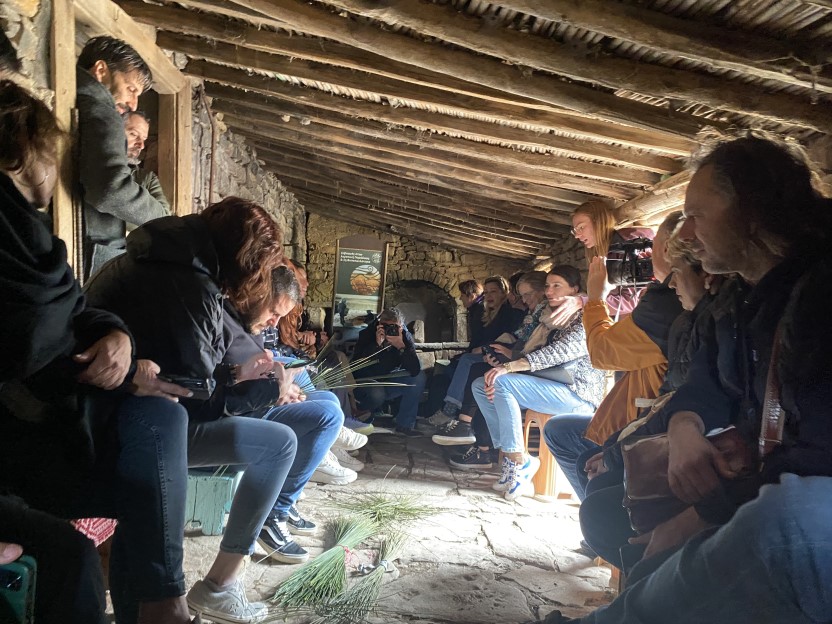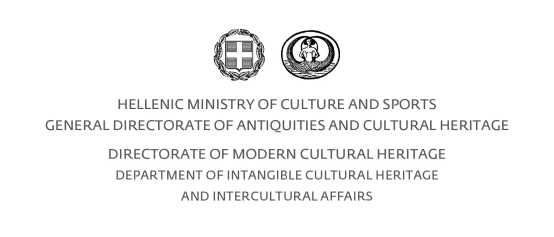
Training of trainers for Greece ‘Living Heritage Safeguarding and Sustainable Development’
The Capacity Building Workshop “Living Heritage Safeguarding and Sustainable Development. Training for trainers for Greece” took place on the island of Lemnos.
UNESCO facilitators Harriet Deacon and Benedetta Ubertazzi, together with seventeen highly qualified trainees (representatives of cultural institutions, academics, cultural managers, teachers) from different parts of Greece, explored through a series of presentations, workshops and related activities the relationship between the safeguarding of the intangible cultural heritage and sustainable development.
The two UNESCO facilitators brought forward the various challenges arising from the relationship between ICH safeguarding and sustainable development and proposed possible ways and models (especially the “Fruits and Roots” model) to address them. The importance of protected designation of origin (PDO) of products and copyright protection in relation to intangible cultural heritage was also highlighted and discussed.
In the context of the workshop, the trainees were further provided with extremely interesting information about a range of projects aiming to promote and inter-relate the intangible heritage of Lemnos on the one hand and the development of local primary and secondary economy and cultural tourism on the other. Particularly instructive in this respect have been the presentations by the MedINA team:
Alexis Katsaros, Director of MedINA, presented the study of a model sheep farm, based on the “mandra”, the traditional Lemnian farm.
Irene Lyratzaki, MedINA Cultural Heritage Specialist, presented MedINA’s Terra Lemnia project.
Rigas Zafiriou, Coordinator of MedINA’s Terra Graeca project, highlighted the opportunities offered by the agri-food heritage of Lemnos for sustainable tourism development.
These presentations were usefully complemented by contributions by:
Sophie Hapsi, local businesswoman, who highlighted the input of gastronomy on cultural tourism,
Polina Chatzigeorgiou, representing Estate Chatzigeorgiou Limnos, who spoke about winemaking and cultural tourism.
Aris Ikkos, Scientific Director of SETE Institute, the research institute of the Association of Greek Tourism Enterprises, who shared interesting insights into cultural tourism in Greece.
The aforementioned presentations were followed by workshops and fruitful discussions coordinated by the UNESCO facilitators. They were also further reinforced by the following activities:
- Visit to the traditional Mandra of Athena Kavaleri (Retail Kavalleri Athena), who shared her life- long experience as a Mandra owner and manager.
During this visit:
Raphael Giannelis, Project Officer of MedINA Terra Graeca Program, shared with the participants the techniques of basket-weaving.
Fotini Poriazi spoke about her activity in the production of traditional pastries with local varieties of cereals.
Panagiotis Chrysafis spoke about the production process of traditional types of cheese (kalathaki, melichloro/melipasto, feta cheese and kashkavali).
- Experiential workshop at Flomari tavern, in Gomati village. There, the participants prepared traditional Lemnian pasta (valanes, aftoudia) and cheese (kalathaki, melichloro/melipasto), under the guidance of Sofi Hapsi and Raphael Giannelis respectively.
Finally, the participants of the Workshop were given the opportunity to further appreciate the multilayered historical and cultural landscape of Lemnos by means of a series of guided tours to the prehistoric site of Poliochni, the Castle of Myrina and the Allied Cemetery of Moudros for the Anzac (Australian and New Zealand Army Corps – fallen soldiers of World War I).
Text as provided by the organiser(s).